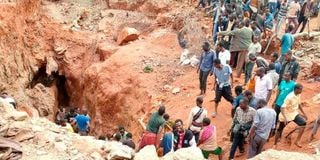Breaking News: Former Lugari MP Cyrus Jirongo dies in a road crash
Premium
10 miners feared dead in collapsed Marsabit gold mine

Miners at the Hillo gold fields on May 23, 2023. The mines were closed by the government after 11 people were killed during a scramble for gold on March 24, 2024.
What you need to know:
- The government had announced that the mines would be reopened for resumption of commercial mining.
- The decision to reopen the mines followed a series of meetings between government officials and other actors.
Ten people are feared dead after the Hillo gold mines collapsed in Dabel, Marsabit County on Tuesday.
Despite closure of the mines in March this year after 13 people died following a clash over how to share the resource, mining continued allegedly aided by security officers deployed the guard the area.
Dabel Location Chief Ibrahim Dube confirmed that seven bodies were retrieved from the mine, adding that the recovery mission is ongoing.
However, a resident of Dabel told Nation.Africa at the site when the mine collapsed, there were 10 miners who had sneaked into the restricted area to continue with mining.
“So far there is no survivor. We fear that the 10 people are dead,” the resident said on condition of anonymity due to the sensitivity of the matter.
Marsabit County Commissioner James Kamau did not confirm the number of people who had died, saying he did not have first-hand information. He promised to give full information after arriving at the site.
“I'm not able to make any confirmation based on hearsay, unless I personally get to the scene," Mr Kamau said, adding that he would also give an update on the recovery efforts.
The incident comes at a time the government had announced the mines would be reopened for resumption of commercial mining.
Speaking during a visit to Moyale on December 3, 2024, Principal Secretary State Department for Mining Mr Elijah Mwangi said mining would reopen after the government finalizes implementation of the mining law.
He directed the backfilling of the open mine pits to begin to pave the way for the resumption of legal mining.
“We have given instructions that refilling of all the gaping gold mine pits should be done before the sites are reopened," Mr Mwangi said.
He expressed concerns over the previous disregard of the environmental hazards and potential danger caused by illegal miners that resulted into deaths of 13 people before its closure.
The backfilling of the gaping mine pits was scheduled to begin this week and will go on for a month before the miners are allowed to resume their activities.
Mr Mwangi explained that the objective of backfilling was to enable proper mechanization of mining activities and to avert any more caving in of pits.
The decision to reopen the mines came following a series of meetings between government officials, the artisenal mining cooperative committee and six communities in the area.
The parties signed a Memorandum of Understanding (MoU) which is expected to provide transparency among the local communities, miners, investors and the national and county government.
Each artisenal group will be assigned a maximum of 5km square mining area after securing 5 years mining permits while miners will be required to commercialise mining activities and ensure they are sustainable.
The State will also deploy geologists in Marsabit to help miners with the development of the recommended shafts.
The gold ore processors and buyers will also be forced to register with the Mining office failure to which they risk getting sentenced to a five-year jail term or pay a fine of Sh10 million.
On resumption of the mining activities, the government will deploy a special mining police unit to man the sites.
Mr Mwangi said the current realignments were aimed at ensuring that the taxation and royalties regime was regularized for the benefit of artisenal miners, multinationals and to lock out illegal traders.
“The measures will also help check the influx of illegal immigrants in the region as the priority will only be given to the local communities,” he said.
Before closure, Hillo mines attracted nearly 70,000 people with at least 80 per cent of the population comprising of illegal immigrants from Ethiopia, Democratic Republic of Congo (DRC), Tanzania, Somalia, South Sudan, Uganda and Nigeria.





